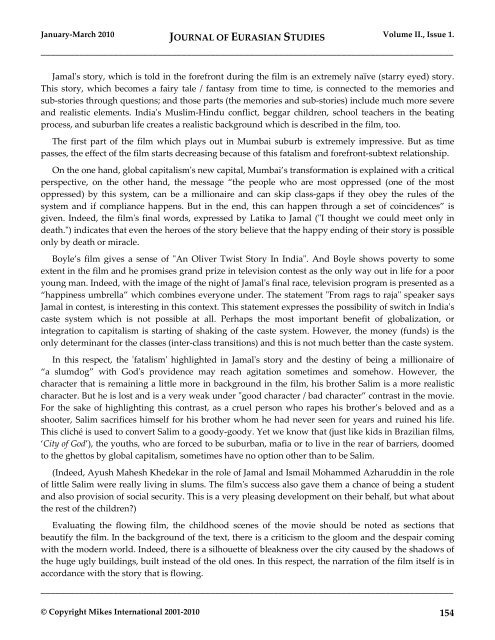EurasianStudies_0110..
EurasianStudies_0110..
EurasianStudies_0110..
Create successful ePaper yourself
Turn your PDF publications into a flip-book with our unique Google optimized e-Paper software.
January-March 2010 JOURNAL OF EURASIAN STUDIES Volume II., Issue 1.<br />
_____________________________________________________________________________________<br />
Jamal's story, which is told in the forefront during the film is an extremely naïve (starry eyed) story.<br />
This story, which becomes a fairy tale / fantasy from time to time, is connected to the memories and<br />
sub-stories through questions; and those parts (the memories and sub-stories) include much more severe<br />
and realistic elements. India's Muslim-Hindu conflict, beggar children, school teachers in the beating<br />
process, and suburban life creates a realistic background which is described in the film, too.<br />
The first part of the film which plays out in Mumbai suburb is extremely impressive. But as time<br />
passes, the effect of the film starts decreasing because of this fatalism and forefront-subtext relationship.<br />
On the one hand, global capitalism's new capital, Mumbai’s transformation is explained with a critical<br />
perspective, on the other hand, the message “the people who are most oppressed (one of the most<br />
oppressed) by this system, can be a millionaire and can skip class-gaps if they obey the rules of the<br />
system and if compliance happens. But in the end, this can happen through a set of coincidences” is<br />
given. Indeed, the film's final words, expressed by Latika to Jamal ("I thought we could meet only in<br />
death.") indicates that even the heroes of the story believe that the happy ending of their story is possible<br />
only by death or miracle.<br />
Boyle’s film gives a sense of "An Oliver Twist Story In India". And Boyle shows poverty to some<br />
extent in the film and he promises grand prize in television contest as the only way out in life for a poor<br />
young man. Indeed, with the image of the night of Jamal's final race, television program is presented as a<br />
“happiness umbrella” which combines everyone under. The statement "From rags to raja" speaker says<br />
Jamal in contest, is interesting in this context. This statement expresses the possibility of switch in India's<br />
caste system which is not possible at all. Perhaps the most important benefit of globalization, or<br />
integration to capitalism is starting of shaking of the caste system. However, the money (funds) is the<br />
only determinant for the classes (inter-class transitions) and this is not much better than the caste system.<br />
In this respect, the 'fatalism' highlighted in Jamal's story and the destiny of being a millionaire of<br />
“a slumdog” with God's providence may reach agitation sometimes and somehow. However, the<br />
character that is remaining a little more in background in the film, his brother Salim is a more realistic<br />
character. But he is lost and is a very weak under "good character / bad character” contrast in the movie.<br />
For the sake of highlighting this contrast, as a cruel person who rapes his brother’s beloved and as a<br />
shooter, Salim sacrifices himself for his brother whom he had never seen for years and ruined his life.<br />
This cliché is used to convert Salim to a goody-goody. Yet we know that (just like kids in Brazilian films,<br />
‘City of God’), the youths, who are forced to be suburban, mafia or to live in the rear of barriers, doomed<br />
to the ghettos by global capitalism, sometimes have no option other than to be Salim.<br />
(Indeed, Ayush Mahesh Khedekar in the role of Jamal and Ismail Mohammed Azharuddin in the role<br />
of little Salim were really living in slums. The film's success also gave them a chance of being a student<br />
and also provision of social security. This is a very pleasing development on their behalf, but what about<br />
the rest of the children?)<br />
Evaluating the flowing film, the childhood scenes of the movie should be noted as sections that<br />
beautify the film. In the background of the text, there is a criticism to the gloom and the despair coming<br />
with the modern world. Indeed, there is a silhouette of bleakness over the city caused by the shadows of<br />
the huge ugly buildings, built instead of the old ones. In this respect, the narration of the film itself is in<br />
accordance with the story that is flowing.<br />
_____________________________________________________________________________________<br />
© Copyright Mikes International 2001-2010 154

















